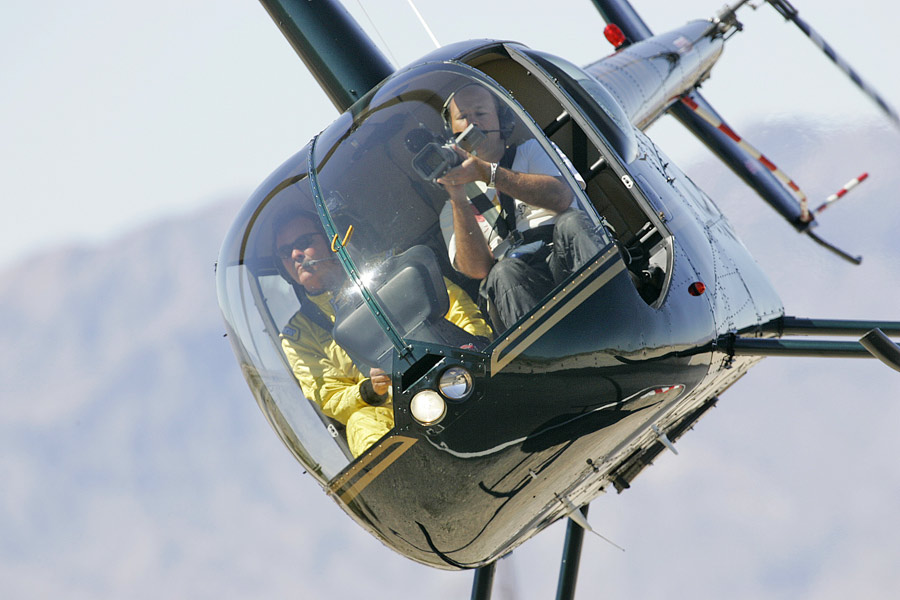A little sensitive over the assumption that working with tools enthusiasts covet makes you a "rich bugger". In order to do my job, I was issued with top-grade kit, and from time to time ran into remarks from resentful people who assumed that it was my play-toys - not the tools of the trade I was required to use. Some folks just don't get that one can be both a photographer and a hard working wage earner.
For either stills or video, helicopters serve as the most versatile of tripods. They can work in urban areas where aircraft can not fly. They also can hover and are easily repositioned in three-dimensional space. When I used them, they were billed to my clients who tended to be real-estate development companies. They needed visual information from altitudes that my biggest tripod would not reach and a helicopter was the most economical way to get the shots. Simply a photographer, an entrepreneurial company and a helicopter rental company all trying to make a go of it - no "rich buggers" involved.
I worked in Daytona Beach, Florida for more than a dozen years as a staff shooter for the newspaper, and covered all manner of motor racing from motorcycles, stock cars to exotic prototypes in the 24 Hours of Daytona. As the staff sports photojournalist, it was up to me to show the behind-the-scenes life that is off-limits to racing fans. While I covered some action, my job primarily was with car-owners, crew and drivers doing their jobs. Countless hours in the garages and pits, decisive moment photography, showing life as it is lived. Responsible for a front page spread for the main and sports section, shots to illustrate stories inside and several pages of just photographs daily. The ultimately intimate inside view of racing.
NASCAR brought out crowds of 100,000+ and the traffic jam after the race went on for many hours. Since I covered the winner's circle after the race, I was trapped and my film was needed immediately. A motorcycle rider met me at the gate, carried my film to a helicopter and it was transported to the office. It was simply the cheapest and most efficient way to meet the deadline. No "rich buggers" here either.
To be in place to cover the pre-race stuff, meant arriving in the early morning hours just in order to be in place. Even then, one was stuck in slow moving traffic. A lot of the drivers did arrive by helicopter. A few may have been rich and a few may have been buggers, but they were there because they loved to race and there were 100,000 fans in the stands who had paid to watch them. Being there on time was not optional.
And yes the teams had rolling machine shops in trailers, buses with full living accommodations and so on. Teams often worked through the night, obviously for the 24 hour race - but for any race. Rebuilding a car that crashed during qualifying, working through the night to have it on the starting grid in the morning, is not a luxurious job, specially when you then had to work in the pits during the race - a very dangerous job should your attention waver. They would grab a few hours of sleep in the bus whenever possible. The buses also served as mobile team offices. No one has ever accused a dead-tired crew member of being a "rich bugger".
Flavio Briatore, who managed Renault F1, was indeed a "rich bugger" in every sense of the word. However after the Singapore scandal, he has been banned from any participation in F1, and I see he is selling off real-estate. I expect he is still a "bugger" but much less rich now. He is the exception, rather than the rule, though F1 tends to be a soap opera on wheels. Racing is a team sport with enormous expenses. F1 teams have budgets in the hundreds of millions, and may have over 1,000 staff members. A five member crew simply screams "small time" nobody.
NASCAR is the dominant racing organization in the USA. A single NASCAR racecar can be close to a million dollars US. Purses from races don't cover it, and owners are constantly having to hustle sponsorship money from corporations. While top teams do prosper, other teams drop out. Having a ten million annual budget does not mean you are a "rich bugger" it can very well mean laying awake at night, trying to figure out how to pay your driver and crew before the next race.
NASCAR is not just the Daytona 500, but also incorporates several lesser series that provide a path for beginners to prove themselves and work their way up. This applies to crew and owners as well as drivers. At the bottom you will find absolutely no "rich buggers" - just people risking everything to try to establish a career.
I knew a lot of team owners, with a couple being close friends. I have also had some close friends among drivers, and saw one die in front of me while covering a Daytona 500. Kind of spoils the day. He too was a successful driver up to that point, but hardly a "rich bugger". He was also one of the nicest human beings I ever knew.
Odd that the track owner was doing his own video. The Daytona Speedway had their own photo/video employees and also hired free lance shooters for that sort of thing. The management of the speedway were far too busy running the huge event to have time to go airborne themselves. Rather than coming off as a "rich bugger", it sounds like it is more of a backwoods, low-budget, small-time race-track, where the owner could not afford to hire staff to do the job, and the event was small enough that he could afford the time away from running the show.
Nuff said.



